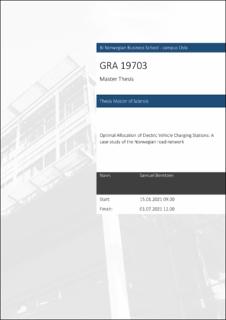Optimal Allocation of Electric Vehicle Charging Stations: A case study of the Norwegian road network
Master thesis
Permanent lenke
https://hdl.handle.net/11250/2826198Utgivelsesdato
2021Metadata
Vis full innførselSamlinger
- Master of Science [1621]
Sammendrag
Allocating fast charging stations for electric vehicles will be an impor-
tant component for ensuring the adoption of electric vehicles. This thesis
proposes a framework for ensuring reachability, meaning that all parts of
the road network should be accessible with a speci c battery capacity. Two
methodologies are tested: (1) a k-Dominating Set with half range, and (2)
a Connected k-Dominating Set for ensuring connectivity, both are tested on
a dataset representing the Norwegian road network. Distance metrics are
measured in kWh for an accurate representation of battery consumption.
Tested ranges are 20, 30, and 40 kWh, each tested with k ranging from 1
to 4.
The experiment nds that the connected k-dominating set, computed
using a greedy algorithm, provides more e cient and desirable solutions
than the k-dominating set when applied to this problem. A simple com-
parison of the current system and a connected k-dominating set for 20 kWh
and k = 2 nds that the current charging station allocation in Norway is
not su cient for ensuring reachability with a 20 kWh electric vehicle, and
that remote, non- urban areas are especially underrepresented in terms of
coverage. Because many parts of the country are already covered, future
allocation of fast charging stations should occur in those that currently have
low or no coverage in order to stimulate the adoption of electric vehicles.
Beskrivelse
Masteroppgave(MSc) in Master of Business Analytics - Handelshøyskolen BI, 2021
